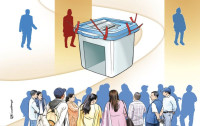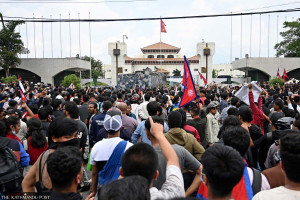Opinion
Power to women
Women’s participation in decision-making is crucial to building a strong state
Samira Paudel
Still unequal
Looking at our state-building process, there have been several changes in our recent political history and as a result, new thoughts and awareness have developed. Even if new political developments have brought changes to society, there are still many gender issues that need to be dealt with. Traditionally, and also at present, women are responsible mostly for household work, children’s education, caring for the elderly and supporting male members of society. This is one of the major reasons why women are not able to directly participate in the public social and political spheres. Despite comprising more than half of the total population, the continuing patriarchal system provides little scope for females to assert their identity in the family, society, political parties and the state. They are marginalised from many economic and social opportunities, despite the circulation of progressive legislations.
Token participation
There is a provision of 20 percent women’s representation in the police and local governance institutions. Even if the former Constituent Assembly consisted of 33 percent women, it only focused on their representation and not their ‘active participation’ in the law-making process. Similarly, in the areas of law, employment, security, foreign policy and trade, very few women are involved and much of the decision-making power remains with a small circle of male leaders. Various groups, including mothers’ groups, forestry associations, human rights groups, health and paralegal association, trade unions, cooperations and saving and credits associations, are spreading democracy at the grassroots level of society but even they do not engage in decision-making at the higher levels. Since women are less represented in law-enforcement agencies, many incidents of violence also against women go unreported.
Speaking for themselves
To encourage women to take part in the public affairs at multi-level governance it is important to ensure actual participation of rural as well as urban women in all issues that concern them. And is important to instill in women, a sense of competence and expose them to the nation’s political culture. They need to be empowered socially, economically and politically, so that they can raise their voice in the community, in political parties, media and in the state institutions. Only when that happens we can make sure that their interests are represented at all levels of society.
Political transformation is necessary, but it will not be possible unless women are involved in knowledge production, research, policy formulation, decision-making and creative social transformation from the post-conflict phase to building peace. Gender equality requires long-term planning in re-socialisation of the younger generation of citizens to ensure that changes achieved are desirable and sustainable. Ways that ensure young women feel equal to their male counterparts in everyday life is vital for their freedom. An ideal starting point would be to encourage women to think critically and reflect on their roles in the family and at work. This can help them realise the importance of their role in the state-building process, to become ‘active citizens’ instead of mere passive beneficiaries of different programmes. For that to happen, political parties, media houses must also be restructured to be more sensitive and responsive to special needs of women in the in society and politics. Further, emancipation of women demands elimination of discrimination at home, society, political parties, civil society and state institutions.
Lasting change
Unless women are able to influence decision-making, whether it be in the state apparatus or within political parties, we cannot build a strong and virtuous state. The constitution has given equal rights to both the sexes, but what seems to be constraining women is the socialisation that they are inferior. In this context, structural reforms are essential to empower women and enable their role as a catalyst of change in society. But as many of the state agencies, lawyers and general public lack gender sensitivity, it is vital to include males in gender sensitisation efforts.
Change, however, begins at home. It has to be the starting point of a more gender sensitive society. Secondly, the notion of equal justice for all members in society must be practised. Third, the notion of freedom must apply equally to both males and females and most importantly, both the sexes should be liable to equal benefits from the state. An effective enforcement of laws is also crucial as the failure to do so has resulted in a significant rise in violence against women. Enforcing gender-friendly laws can help reduce discrimination against women and even open new avenues for women in the public sphere. Organisations working in women’s issues can monitor the activities of the state and pressure it to abide by its own regulations. But for that, they need to be united as a group first. Violence against women should be stopped at all costs by ensuring rule of law and through the collaboration of men and women. Only then, can women be emancipated and empowered to effectively take part in the state-building proces.
Paudel is gender-coordinator at Friedrich-Ebert-Stiftung




 10.92°C Kathmandu
10.92°C Kathmandu












